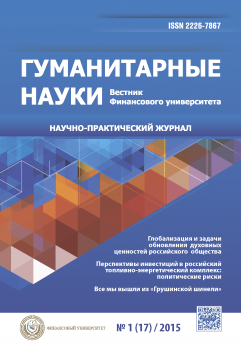In modern terms, the information permeates all aspects of an individual and society business: economy, social sphere, politics. Information is a resource of a manager. The process of managing is an information process. When philosophers consider questions relating to information, they made to focus on one or more properties of the information, while others are not mentioned at all. But in the management science the basic properties of information are clearly defined. This is reliability, objectivity, accuracy, completeness, topicality, usefulness. With the evolution of the theory of management, the balance of the importance of information properties has changed. But we should not forget that all basic properties of information are important and losing sight of some of them and giving absolute and unconditional value of just one is unacceptable. Properties of the information and the leading of one of them can be assigned to different control concepts interpretation, depending on the period of evolution of the theory of management. In the classical paradigm of management the most important properties of the information is completeness, objectivity and accuracy. Neoclassical paradigm of management focuses on the accuracy and topicality of the information received. Modern paradigm of management is fundamentally different from the classical and neoclassical ones that recognizes a priori the impossibility of obtaining perfectly accurate, objective and complete information. Usefulness of the information comes to the fore, even if the information is knowingly false, distorted or subjective. The manager, acting in modern environment can not only transform, but also artificially create the information that later he uses. The difference of modern management paradigm from the classical and neoclassicalonesis that the information is now viewed not as some external resource. At the present stage of evolution of management science information can be created artificially and is an important feature of a manager is the ability to transform information, increasing the usefulness, one of its properties. In the context of such an attitude to the management of general and management information such as the chaos it is not perceived as a threat but as an opportunity to obtain significant competitive advantages for the shortest possible time. The chaotic state of the system, contrary to the prevailing views in the classical period, is not complicated, and simplifies the management process. Information is one of the most important resource of our time. The information was an important tool for management at all stages of evolution of management science, it is actively used in any management paradigm, but the nature of the use of the information has changed, according to the natural changes in managerial philosophy, adhering to new paradigms.
information, management, management information, management philosophy, managerial philosophy, classical management paradigm, neoclassical management paradigm, modern management paradigm, properties of information, reliability, objectivity, accuracy, completeness, topicality, usefulness
Современный мир характеризуется высокой степенью информатизации. «Информация и информационные процессы <...> пронизывают всю деятельность человека и общества в целом» [1, с. 185]. Это верно как в отношении бизнеса и социальных организаций, так и применительно к международным экономическим отношениям и политике. Важнейшим ресурсом управленца любого уровня, конечно же, является информация. Согласно принятому в Российской Федерации определению, информацией принято считать сведения, полученные в процессе коммуникации человеком или специальным устройством, являющиеся отражением неких фактов [5]. Таким образом, понятие «информация» неразрывно связано с понятием «коммуникации», т.е. обмена сведениями.
Любые управленческие решения принимаются на основе анализа информационных потоков (сведений) от различных источников (участников коммуникации), которыми могут быть текущие данные о происходящих процессах, карты тестирования, системы рейтингов, обратная связь с поставщиками и работниками и т.д. (различные формы отражения фактов). Сам процесс управления, по сути, является переработкой поступающей информации в управ-ленческие решения, которые, в свою очередь, тоже являются информацией. Иными словами, процесс управления – это процесс преобразования информации в информацию. Процесс управления – это, безусловно, информационный процесс. Это один из важнейших критериев, обусловливающих неослабевающий интерес к проблеме информации в работах по философии управления.
Однако при рассмотрении вопросов, касающихся информации вообще и информации управленческой в частности, зачастую авторы выделяют в качестве важного фактора одно или несколько свойств информации, нередко вовсе упуская из виду остальные. Таким образом, превознося одну сторону управления, одно качество управленца или системы управления (безусловно, важное, но не всеобъемлющее, не затмевающее остальные), автор забывает об остальных важных нюансах, принятых на аксиоматическом уровне в классическом учении менеджмента. Такой подход приводит к однобоким, субъективным выводам, не отражающим реального положения вещей.
1. Grachev V.I.Aksiogennye svoystva informatsii v sotsiokul’turnykh kommunikatsiyakh [Aksiogennye property information in socio-cultural communications]. Vestnik Leningradskogo gosudarstvennogo universiteta im. A.S. Pushkina [Bulletin of the Leningrad State University. AS Pushkin]. St. Petersburg, LGU Publ., 2013, pp. 184-193.
2. Afanas’ev V.G.Sotsial’naya informatsiya i upravlenie obshchestvom [management of the company]. Moscow, Knizhnyy dom «LIBROKOM» Publ., 2013. 408 p.
3. Dmitriev A.S. Determinirovannyy khaos i informatsionnye tekhnologii. “Komp’yuterra” № 47, 01.12.1998 [Deterministic chaos and information technology. “Computerra” number 47, 01.12.1998]. Available at http://old.computerra.ru/1998/275/194794/ (accessed 14 April 2016).
4. Uebster F.Teorii informatsionnogo obshchestva [Teorii information society]. Moscow, Aspekt Press Publ., 2004. 400 p.
5. GOST 7.0-99 Informatsionno-bibliotechnaya deyatel’nost’, bibliografiya. Terminy i opredeleniya [GUEST 7.0-99 information and library activities, bibliography. Terms and Definitions].р-. 5. GOST 7.0-99 Information-library activities, bibliography. Terms and definitions.





